Doug Belanger and Kate Campanale
Recorded live on Wednesday, October 8, 2014, at the Small Business Candidates' Night, hosted by MassLandlords.net at Worcester Technical High School.
Doug Belanger and Kate Campanale for 17th Worcester Representative
[Start 0:00:00]
Raymond Mariano: Welcome to our debate this evening. There will be four separate debates. The debate is sponsored by MassLandlords.net. First, we will have candidates for state representative, who is seated here, and I’ll introduce them in a moment. Following them, we will have candidates for state senate here, and then I will introduce them; then state auditor and lieutenant governor.
The format is the same for each of the four debates. They’ll start with an introduction, and their opening remarks, and then we’ll go to questions. We have a timekeeper in the front. She will show them when they have 1 minute left for their response and 30 seconds and 15 seconds, and then she’ll show them time. When she says time, if they don’t stop, I promise to interrupt them, and we won’t allow anyone to go forward. We have a very tight time schedule.
If you want coffee, it’s up on the back on the right. Please help yourself. I’m going to ask you to do me a favor. Please everybody shut off your cellphones. I know that we can’t live without them, but please shut off your cellphones or silence them so that we don’t have to have our candidates interrupted.
Before we started, we had a coin flip, and the candidates decided the order of their responses. We’ll have one, then the other, and then we’ll flip from question to question.
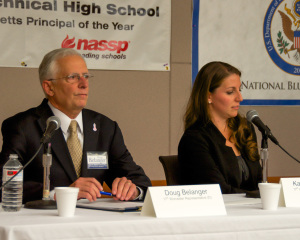
Doug Belanger and Kate Campanale, both candidates for 17th Worcester Representative, get introduced by moderator Ray Mariano at the start of the MassLandlords.net Small Business Candidates' Night 2014.
Our two candidates, first Doug Belanger. Doug has been volunteering throughout Worcester and Leicester for over 30 years. He currently serves as the treasurer of the WRTA, a member of the Worcester Airport Advisory Commission, and after serving as the town’s Finance/Advisory board chairman for 10 years, has been elected and reelected Leicester Selectman for the past 18 years.
Our second candidate is Kate Campanale of Leicester, who was born and raised in the district. She’s a graduate of Leicester High School and holds a degree in business management from Sweet Briar College. She brings a breadth of experience including federal and state government, private sector business development and has also taught in our public schools.
Now with the opening statements, we’re going to start with Ms. Campanale. Two minutes.
Kate Campanale: Thank you to MassLandlords.net for hosting this event tonight. Thank you, Mr. Mariano, for moderating this forum for us. Thank you everyone for coming. I’m glad to be here tonight to participate.
Why am I running? I’m running because I believe I can make a difference. I have the background, I have the experience, and I have the drive to make this happen. I’ve been passed on a strong work ethic from my parents, who are both small business owners and actually former property owners in Leicester as well. Like many of you here, I’ve always had an interest in real estate, which spurred me to get my real estate license here in Massachusetts just a few years ago.
This election offers my community and my neighbors a choice – a choice between keeping the status quo and actually changing to bring some more balance and strengthening our community here. That really only comes with some new action and some new leadership. I have a plan for this. In working at the state house, I have the experience to engage our communities from both sides of the aisle, to work with our businesses, our schools, our community leaders, and neighborhoods.
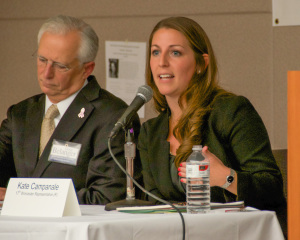
From left to right, Doug Belanger and Kate Campanale, both candidates for 17th Worcester Representative, during the MassLandlords.net Small Business Candidates' Night 2014.
I understand the legislation process. I really want to work to lift the regulations that are strangling our economy and encourage growth and restore confidence. I want to work with families who have to cut their household spending, work with our children who are sharing textbooks in our schools, and working for seniors who are trying to survive on fixed incomes.
I have and will continue to work diligently everyday to turn my passion into action and bring a fresh perspective to make this community great, and I look forward to sharing some thoughts through your questions here tonight. Thank you!
Raymond Mariano: Thank you, Miss Campanale. Now, Mr. Belanger. Two minutes.
Doug Belanger: Thank you, Ray, and the MassLandlords and your affiliates for holding this event tonight. I was born the third of seven children and raised in Worcester where my parents had a three-decker on Freeland Street. Then as the family grew, they bought an old millhouse in Cherry Valley section of Leicester.
I started my work career at the age of 15 at the local Valley Market owned by the Goretti family. At a young age, I was appointed the manager of that store and eventually as that family chain grew, I became their store manager for all four stores by the age of 28. The following year, me and my partner opened up our own convenience store in Worcester, and by the age of 30, we had three small convenience stores and one full supermarket in our partnership suburban supermarkets.
[0:05:17]
I am a husband, a parent, a homeowner, and taxpayer. My wife, Donna, and I will be celebrating our 28th anniversary next week. Thank you, Donna, for all the years, and I’m happy to say we have two fully employed adult children – one, Michael at 24, and my daughter, Nicole, at 26.
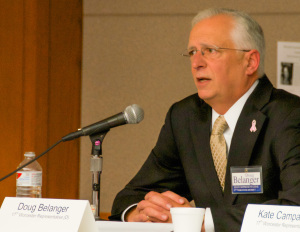
Doug Belanger, candidate for 17th Worcester Representative, speaks at the MassLandlords.net Small Business Candidates' Night 2014.
As the moderator said, I’ve been volunteering throughout Worcester and Leicester for over 30 years. During that time, I’ve served as an advocate, a mediator, and a problem solver. I’m ready to do the job from day 1 because I have actually been doing the job. I’ve drafted legislation. I’ve built coalitions. I’ve lobbied, testified, and been in positions of authority that have withstood scrutiny and have withstood the test of time.
Thank you and I look forward to answering your questions.
Raymond Mariano: Now to our questions. There are two questions in the first section. Each will have 2-minute responses. The first question we will start with Mr. Belanger. It’s on affordable housing. Most housing authorities across the state have very lengthy waiting lists. In Worcester, the housing authority has more than 12,000 applicants, many of them homeless and some who have been on the waiting list for more than a decade. What would you do to reduce that backlog and help those families find housing? Two minutes, Mr. Belanger.
Doug Belanger: Thank you. Well first, Ray, I would support your Better Life Program, not just because you’re a moderator but because I think it’s a great program. I live by, I brought up my children by, I run my businesses by, and I have negotiated contracts by taking the best of both, seeing there’s positive incentives for doing things right and negatives for let’s say for doing things not so right. I also work and identify property in Worcester and Leicester that need rehab. They’re either abandoned or they’ve been repossessed, they’re in foreclosure, and so on. Create housing zones that would work with our CDCs, work with the landowners, the corporations, the contractors to be able to expedite through the process, working with the city government to open those houses up, to get those built.
CDCs have done a great job over the years, but they often don’t get the support they need. In that, it is also about expediting permitting because again empty abandoned houses going by some rules that are cumbersome and time-consuming keep them off the market. It adds to our homelessness, adds to abandoned buildings, adds to all the issues we want to talk about. Combined with that working with a city delegation, the city government, and the builders and contractors, you’d be able to do this. Thank you.
Raymond Mariano: Okay. Miss Campanale, 2 minutes.
Kate Campanale: Well, as I had stated back in August at our first debate, I also supported your Better Life Program. I believe it’s a great program to actually give preference to people who want to work, who want to better their lives, and I think that really breeds a great environment and stronger community. It really breaks the cycle of people who have unfortunately been in public housing for many generations. I think what’s most important, too, is also to make sure we have the jobs as well, and I think altogether, making sure people have the want to work and giving them that incentive and opportunity will really better the lives of those in public housing and maybe set an example for the community as well.
Raymond Mariano: Next question is on economic development. It goes to Miss Campanale. What specific plans would you propose or support to spur economic growth in Greater Worcester?
Kate Campanale: One program that Worcester has in place already more on the housing level is I believe a housing development incentive program, which many of you may be aware of takes existing property as is. The property owner comes in, fixes it up, puts a lot of work and money into it to increase the property value and actually get tenants into the building. Instead of slapping the owner with a tax bill right away, they’re able to spread it out over a period of years.
[0:10:05]
If we can take this housing development incentive program and create this on a corporate level like a corporate incentive development program, put some of these vacant buildings in Worcester back to work. One business comes in that will bring another business in. It brings customers, it brings jobs, and it spurs development, and that’s something we desperately need.
Raymond Mariano: Mr. Belanger, 2 minutes.
Doug Belanger: Thank you. I believe the question was related to spurring economic development, and as the chairman of our economic development committee, I’ve been doing that for a number of years now. Part of my ability back from earlier business to now working with organized labor, I’m able to build coalitions that would have training for those students, for those young folks let’s say that are not college bound for whatever reason, and then taking the chronically unemployed and creating a program that has internships with relationships between business and labor to be able to learn a trade.
It would not only spur economic growth, you earn as you learn. You are gaining something that will become a better job than what you might have had prospects before, but you also have a hope to stay out of trouble let’s say and to stay in the system because you’re gaining, you’re growing, you’re learning your trade, you’re breaking a cycle. And so, that’s immediate economic growth. It’s tangible. It’s something we can do.
Also Worcester has the stat of Worcester through the chamber of commerce that has a program they are kicking off that has to do with almost a shark tank idea ‑ taking our college grads and giving them incentives. They present a program. They present an idea, and you reward that through chamber and private enterprise with helping them start up their business. You have reasons for our college students to stay and grow, and you have reasons for those youth that are not college bound, and for those that were chronically unemployed. That will stimulate economic growth.
Raymond Mariano: Okay, the next section is property- and property owner-related questions. Candidates will have 1 minute to respond. The first question goes to Mr. Belanger. Massachusetts is the only state or one of the only states in the country that requires landlords and property managers to wait 30 days to assess late fees. House Bill 1670 would allow a late fee to be assessed after 10 days. Do you support this bill? Why or why not, Mr. Belanger?
Doug Belanger: Thank you. I think overall as a negotiator, I don’t just jump on the first offers. I’d be reluctant to just jump on and say, “Yep, 10 days.” I would like to talk about it and really negotiate and perhaps amend the process to have a growing stage. When I was a little younger and my parents were still here, they had a tenement house they bought from across the street, but they moved to Florida, and I became a quasi-landlord not by choice.
It comes down to I think there’s a piece of this that says if we can find the best solution and we’re not adding to the burden of the tenant and making the place empty but having a positive incentive, as I mentioned earlier with more time that said that you could have a positive as in rent rewards or reductions for being on time and major penalties if you’re late.
Raymond Mariano: Thank you. Miss Campanale, 1 minute.
Kate Campanale: Okay. Yes, I do know this bill. I’ve actually read it and understand it. What it does is take the 30 days until you can charge a late fee and move it to 10 days. I would absolutely support this because I know as a landlord, you have a mortgage to pay, too, which you have usually a 15-day grace period. If you’re letting a tenant go 30 days without assessing a late fee, well you can be late on your mortgage as well, and I think we really need to have that balance, so landlords or property owners have the same rights or equal rights as tenants.
Raymond Mariano: Thank you, Miss Campanale. All right, the next question goes to Miss Campanale. Worcester has a large number of undergraduate and graduate students, but according to the Worcester Municipal Research Bureau, only half of the graduates plan to stay in Massachusetts and only 18 percent in Worcester. Half of the students cited the “look and feel” of Worcester’s neighborhoods as a major reason for not staying. What can you do about this?
Kate Campanale: Well, first we should take a look at Worcester and why they’re coming in. Worcester is a big service community. One of our greatest services that we offer are our education and our healthcare, and this is what’s bringing the students in. They’re coming in. They’re getting jobs here in the city. They’re spending money, but they’re leaving the state because we’re not offering the jobs here as well. I’m not sure it’s exactly the look and feel as well, but if they have better opportunity out of state. I know this from being in school out of state and actually I worked in DC for a while as well. To have a lower cost and better job opportunities out of state, we need to make sure we have those here in Worcester.
[0:15:39]
Raymond Mariano: All right. Thank you, Miss Campanale. Mr. Belanger.
Doug Belanger: Thank you. The WRTA started a program. We have the largest fleet of all electric buses. We’ve modernized and gone with a program that will spread the campuses into our city. That’s the beginning of a process. We need to have the disconnect of just being campus-only versus somewhere out there as Worcester to having that bridge. We’ve started to do that. As treasurer of WRTA, I’m very proud of that program and it’s just grown.
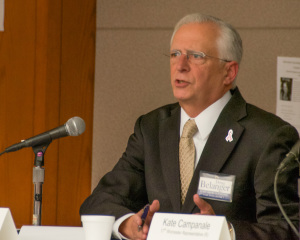
Doug Belanger, candidate for 17th Worcester Representative, speaks at the MassLandlords.net Small Business Candidates' Night 2014.
At the same time, part of the program as I mentioned was to start having businesses and business incentives for our students, have internships for both students and others, to keep growing, to create that network, that bond, that pride that says, “You know what, I’m here in Worcester. I’m going to stay in Worcester. I’m going to build a business in Worcester or start my family in Worcester.” Thank you.
Raymond Mariano: Let me just stop for 2 seconds and tell the folks that are standing in the back we’ve got seats over here. We’ve got seats in the front. If you want to come down and take a seat, please feel free to do that. All right, the next question 1 minute goes to Mr. Belanger. Because of the scandals involving widespread shoddy practices on behalf of major banks filing for foreclosures, Massachusetts and other states boosted regulations. One of the results is an increase in the number of abandoned properties that sit unoccupied in the neighborhood for a long time before those properties can be put up for sale. According to an article published in the Worcester Telegram, Worcester County has ranked in the top 10 in the country in these properties. What can you do to reduce the time properties remained abandoned, Mr. Belanger?
Doug Belanger: Thank you. Well one of the things they forgot to do is the other half of the equation as the strength in regulations, which in some ways is a necessary evil. They didn’t strengthen the regs to do with foreclosure prevention, and that’s where one of the pieces needs to be tightened up. But separately from that, there is also in most states a mediation process that really helps prior to foreclosure and has some teeth to it. Unfortunately, Massachusetts is very weak on that also. A combination of those things, I would give some teeth and strength to that. I would advocate and promote such programs. I would also then tie back to everything I talked about the CDCs and the incentives to be able to develop that property and save it to get it off the empty market.
Raymond Mariano: Okay. Miss Campanale, 1 minute.
Kate Campanale: Okay, sure. I see a lot of these abandoned homes in neighborhoods throughout Worcester. As you’re going door-to-door nearly almost every day, so I can see the direct effect that these are having to our neighborhoods as well. What I think the problem here too is that so many of these cases are tied up in federal court, and much of this is the reason because they went to a paperless system that I believe it’s years for the electronic filing. It’s very difficult for the courts and the cities to keep track of who actually holds the mortgage note, and so this is a problem in the federal courts in working through that electronic system. That’s something we have to work through.
Raymond Mariano: The final section responses are a minute and a half in length. Miss Campanale, the first question goes to you. There have been several tragic examples of failure by the Department of Children and Families, DCF. What needs to be done to ensure that this agency operates effectively and that vulnerable children are protected?
Kate Campanale: Yes. This is a pretty hot issue, and I believe what we can do in DCF is to increase technology. I think we can take the steps to make it more efficient. Talking to social workers, they don’t have the technology say like iPads or iPhones to be able to keep track of their paperwork. I think to make a more efficient system for them would make it much easier. I know they are visiting a child on a house visit. They are having problems. They have to take them to the hospital. They’re backlogged now in all their casework.
Also I think to help with some of the pieces well is to with this technology, you go for a house visit, you are able to take a picture of the kid, the surroundings, and be able to upload that maybe right on the database. Using some technology and innovation I think would really help in the DCF.
[0:20:16]
Raymond Mariano: Thank you, Miss Campanale. Mr. Belanger, one and a half minutes.
Doug Belanger: We failed those children. All of us did. We did so because there is I think an easy reference to we need to run our government agencies more like a business. That’s kind of easy to say and sometimes hard to argue with. But the reality when I ran my first retail stores, it was in the last recession. When business backed off a little bit and I had less customers, I bought less products because the customers are buying less, and I used less help because I need less help. Business can do that. As tough as it was, I worked a lot more, and so did my family, but you know what, that’s what you do in a business.
It’s just the reverse in an agency that takes care of children, especially troubled families and kids with issues that need a lot of attention. What happens? We take an agency in this recession. We reduce their resources but we increase their caseload. That’s the opposite of what you do in business. And so what happened is the inevitable crisis. We caused that, all of us because we should stand up for our courage, for our convictions. We should hold our elected officials accountable, and when these kinds of things happen prior to the tragedy, you say, “You know what, in this case I’m willing to pay a little more. I want more accountability, more efficiency, but you know what, take care of those children.”
Raymond Mariano: Thank you, Mr. Belanger. Next question goes to Mr. Belanger. Last year, the legislature passed and the government signed a welfare reform bill. Are there additional steps that should be taken to protect against fraud and abuse of public benefits?
Doug Belanger: Well I’m sure there are because we’re never really going to be done. It’s human nature. I will say that after [unintelligible 0:21:56] report about a year ago, our state government figured out that there was more fraud than they thought. But because we were sending EBT cards, mailing them and transferring them electronically to Florida, Texas. There were 4,000 people after that [unintelligible 0:22:12] report taken off the rolls. At the same time, I am not one of those that take the stories of all the terrible welfare Cadillac mom or whatever it is because I don’t buy that either. There are people that I meet everyday not only through this campaign, but through all the things I do to help them socially in this community that need and deserve those benefits. You protect them by getting rid of fraud.
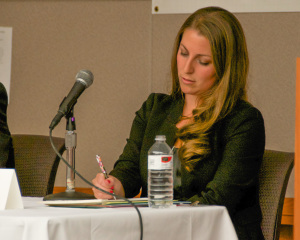
Kate Campanale, candidate for 17th Worcester Representative, prepares her comments during the MassLandlords.net Small Business Candidates' Night 2014.
I appreciate the new legislation that requires picture IDs. I appreciate it now that they’re screening more electronics, so that we don’t mail out of state. You have the right as an American to spend your money where you want once you get it, but you can’t live out of state and have us take care of you. There’s a balance here. We’ve gotten better at it, and I’m sure there’s more to be done.
Raymond Mariano: Miss Campanale.
Kate Campanale: The welfare reform bill was a great start. I think there’s still a lot more that can be done. First and foremost, we do have to make sure that the people who need the benefits do get them. I’m proud to say that I worked with Shaunna O’Connell on a number of her amendments and issues in trying to reform the welfare system. Part of it there is not much accountability either and I think that’s something that we really need to strengthen as well and make sure that our legislators are standing up for this reform as well.
Raymond Mariano: Thank you. All right, the last question that we have on the list is my favorite. Let’s start with you, Miss Campanale. Tell me an idea proposed by your opponent that you would consider adopting if you got elected.
Kate Campanale: That is a great question [laughter].
Raymond Mariano: I know it.
Kate Campanale: Well, I guess I would have to say that I haven’t – I’d be happy to take a closer look at some more and see where there is a bill that we can compromise on, but there’s not one at the moment.
Raymond Mariano: All right. Doug, you got the Zippo.
Doug Belanger: It’s a piece of cake.
Raymond Mariano: All right. Doug, your response. Tell me an idea proposed by your opponent that you would consider adopting if you get elected.
Doug Belanger: I would first say that after 30 years of being scrutinized in public life, there has to be something that if I were on the opposition I would find it made sense. In fact, just for everybody’s sake, Kate you did agree with me when I proposed the budget in the town meeting, this most recent town meeting, and you voted with me. Just to help you out there [laughter].
Myself after 30 years like I said, I’ve had few regrets. I mean certainly things when you look at in hindsight in any part of your life, you got to be thinking, “Well, I would have done that different if I knew what I know now” kind of thing. But I will tell you that in this case, with no available record of my opponent that I can find an actual vote other than the one I just mentioned, and that would be agreeing with myself, so that doesn’t make any sense.
[0:25:13]
It really comes down to I don’t make agreements, don’t enter into agreements without knowing specifics. Simple campaign slogans or the usual rhetoric of we need change, or we’re going to do things better, or we’re going to lower taxes as we increase spending, I don’t buy it. I don’t support, and I really don’t find any details. If indeed there is a detailed paper, if indeed we could be supplied with a detailed paper, I work bipartisan. The 18 years as a selectman is a bipartisan job, so I don’t have a problem with the issues. I don’t have a problem with the right or the left. If I agree with it, I’ll fight with it with passion regardless of where you come from. But I won’t agree to something that just doesn’t have any details. Thank you.
Raymond Mariano: To summarize, she doesn’t like anything he said and he doesn’t like anything she said [laughter]. All right. That concludes the questions that we have for the candidates. How about a nice round of applause for both of them [applause]?
Doug Belanger: Thank you.
Raymond Mariano: Kate [unintelligible 0:26:12] job.
Doug Belanger: Thank you.
Raymond Mariano: All right.
Doug Belanger: Kate.
Kate Campanale: Okay.
[End 0:26:32]




